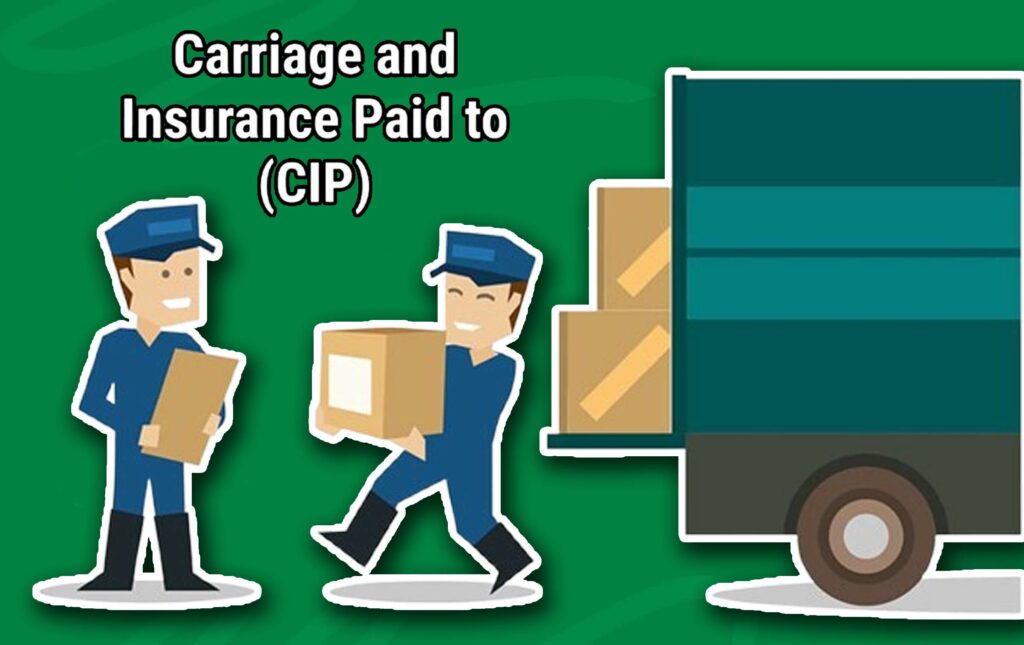What is carriage and insurance paid to (CIP)? How does it work, and what does it cover? In this comprehensive guide, we will be exploring more details about what this type of insurance is and how it benefits a policyholder. Meanwhile, in the world of international or global trade, making sure that goods and products reach the desired location safely and in excellent condition is very important.

Moreover, when goods are shipped across borders, both the buyer and the seller need to know the different incoterms that order the transportation costs and responsibilities. One of these powerful terms is carriage and insurance paid to (CIP) and it offers protection and clarity in intercontinental shipping.
What is Carriage and Insurance Paid to (CIP)?
Carriage and insurance paid to, also known as CIP, is an incoterm usually used in foreign trade to illustrate the responsibilities of the seller for transporting or shipping goods to a particular location.
Moreover, under this incoterm, the seller is in charge of making arrangements and payments for insurance and transportation up to the destination agreed upon. While the buyer will be responsible for the risks once the goods are in the hands of the carrier.
Hence, carriage and insurance paid to (CIP) is designed to give a balance of cost-sharing and responsibilities between seller and buyer, offering a better approach to handling freight insurance and logistics.
How Does It Work?
As mentioned previously, under carriage and insurance paid to the seller, the seller makes plans to make payment for both the insurance and carriage of the products to the specified destination.
Moreover, the seller will be responsible for the cost and risk up to when the goods or products are delivered to the carrier at the agreed location of the shipment. After this, the risk shifts to the buyer. However, the seller will still be liable for insurance coverage until the package arrives.
What Does Carriage and Insurance Paid to (CIP) Cover?
Here is what CIP (carriage and insurance paid to) typically covers:
- Insurance premiums.
- Transportation costs.
- Delivery to the carrier.
- Export customs clearance.
What Are Its Exclusions?
Here are the exclusions associated with this type of incoterm:
- Transportation beyond the designated destination.
- Storage or special handling costs.
- Import customs taxes and clearance.
- Additional insurance costs.
- Unloading costs.
- Costs of loss and damage after carrier delivery.
Who Needs a Carriage and Insurance Paid to (CIP) Policy?
You should consider buying a carriage and insurance paid to (CIP) policy if you are:
A Seller in Complex Supply Chains
Any business owner who is into complicated supply chains needs to have insurance and transportation responsibilities.
Importers and Exporters
International trade businesses that need direct terms for transportation and insurance duties.
Distributors with Global Reach
Firms that are into distributing products across borders need a structured approach to risk management and cost-sharing.
Buyers Worried About Insurance Coverage
If you are an importer and you are looking for a way to make sure that your products and goods are well-insured during their shipping and delivery, you need CIP.
Freight Forwarders
Logistic providers or freight forwarders who need to handle the insurance process and shipping of their clients need this type of incoterm.
Manufacturers Shipping Abroad
Companies that are into transporting products and goods to overseas markets and want to make sure that their products are sent and insured well need this.
How Much Insurance Does Carriage and Insurance Paid to (CIP) Require?
The seller needs to take out 110% of the contract value in insurance. Thus, if the buyer wants or needs more insurance coverage, the arrangement and payment are their responsibility.
This makes sure that the products are protected against damage and loss risks during transit. Meanwhile, the exact value of insurance coverage can be discussed between the seller and buyer based on the potential risks of the journey and the value of the goods.
When Should I Consider Carriage and Insurance Paid to (CIP)?
If you want a structured distribution of responsibilities between sellers and buyers for insurance and transportation. Meanwhile, carriage and insurance paid to (CIP) can be useful when:
- Handling complicated shipments.
- Need proper insurance coverage.
- Confirming cost sharing.
- Managing international or foreign transactions.
- When the buyer needs or wants insurance up to the destination or specified location.
- If you want comprehensive protection during transit.
- If you want to reduce potential risks.
Based on your needs, you can figure out whether or not you need CIP or not.
Frequently Asked Questions (FAQs)
What is the difference between CIP and CIF?
The major difference between CIP and CIF is that CIP needs the seller to cover the insurance up to the destination and can be used for any transportation mode. On the other hand, CIF comes with insurance coverage that is only up to the destination port and is only for inland or sea waterway transport.
Who is responsible for unloading the goods at the destination?
After the package or product reaches the designated destination, the buyer is responsible or in charge of offloading the goods because CIP only offers insurance and transportation protection.
Does CIP cover all risks during transit?
Sadly, carriage and insurance paid to (CIP) require the seller to offer insurance at a particular coverage level, but all potential risks might not be covered. But you can have additional insurance for wider coverage.



